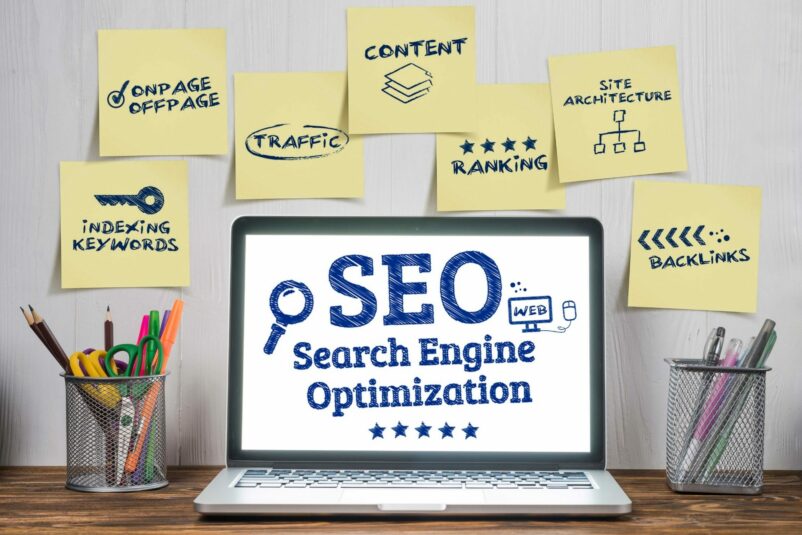If you are a small business owner with a website, chances are you have heard the term ‘search engine optimization.’ Abbreviated SEO, many small business owners know it’s something they ‘should’ do although so many don’t know exactly what it means or how to do it. In this article we are going to simplify one of the most common questions we get, What is SEO?, in a way that any small business owner can understand and share seven success factors of SEO crucial to online success.
What Is SEO?
When a client or prospect calls us and asks about SEO (actually what we usually get is, “I need some SEO!”), we typically ask them what they know about SEO. What we hear from almost all of them is—”SEO is about keywords and making sure we have them on our web pages and in our content.”
If that were the case, SEO would be easy! All you need to do is figure out what word or phrase people are searching for and load your web page up with that word or phrase so it will appear in search results, right?

Well, it’s not that easy. That is what people used to do to fool the search engines, a practice known as keyword stuffing. It didn’t take long for search engines to catch on and the algorithm was quickly changed. Sites caught keyword stuffing are now penalized or even banned.
This is why a simplistic view of what is SEO just won’t cut it in today’s competitive online world. Every small business owner who is dependent on an online presence to market their expertise, products or services should take time to educate themselves on what SEO is and how to use it to their advantage. And we are here to help!
There are many fine definitions of search engine optimization out there, but we’d like to throw our own into the ring as a straightforward explanation that will help small business owners think more than just ‘keyword’ when they read or hear the word ‘SEO.’ To us, search engine optimization is:
VirTasktic’s Definition of SEO – The recognition that search engines have certain rules and formulas for how web pages are listed in a search, and that there are many things small business owners can do to improve their ranking.
A Brief History of SEO
The rules and formulas used by search engines are called algorithms, and while changes used to be slow, giants like Google now change their algorithms around 500 to 600 times each year. Here is a breakdown of some of the most significant algorithm updates, including:
- Google Hummingbird
- Google Mobile-Friendly Update
- Google Panda Update
- Google Penguin Update
- Google Pigeon Update
- Google Payday Update
- Google Pirate Update
- Google EMD (Exact Match Domain) Update
- Google Top Heavy Update
In the early 1990s, as websites began to flood the internet, search engines were created to index what websites were available and improve accessibility. In 1993, Excite revolutionized the process by sorting web pages according to keywords found in the text. Soon after, other search competitors followed suit. Keyword stuffing became rampant, and search engines knew they had to refine their formulas to provide better search results to users.

By the early 2000s, search engine giants like Google had taken control of the situation by cracking down on unethical tactics used to manipulate search results. To improve indexing (and give users a better experience) they penalized practices like keyword stuffing.
As a result, marketers switched their focus to trying to get as many inbound links as possible to increase exposure and their chance of appearing in search results. Much like happened with keywords, people tried to ‘trick’ the search engines by overusing links or adding links that were irrelevant and had no value. But, the search engines quickly caught on and started penalizing bad linking practices too.
Since the early 2010s, the focus of SEO and ranking has been on content. In 2011, Pew research found that half of all US adults used at least one social media site. To further give users what they want, search engines also began to index and display social results in search, too.
Today, search engines are now concentrating on identifying the highest quality web pages, from a technical and content value perspective, for a particular search term to return the best results to a user’s search. This includes sites that meet their technical requirements and are also providing the most valuable content to fit the search.

How do they define value? It’s content that has been engaged with, others are sharing or linking to, and is authentic. Search engines are now using AI (artificial intelligence) to essentially ‘read’ the content you are publishing online and grading its value. The hope with these changes is to eliminate all the ‘useless’ or garbage content that exists online and support those taking the time to create and publish content of high value.
How an Online Business Can Improve SEO On Their Website
Now that you have a general understanding of what SEO is and how the search engines analyze your information for ranking, we can focus the steps to improve SEO for your website. It all starts with optimization, or as Merriam-Webster dictionary defines it: the act of “making something as fully perfect, functional, or effective as possible.”

Going back to that last statistic we shared, 500 to 600 search algorithm changes per year certainly sounds daunting to the average small business owner. It’s no wonder why so many people end up equating SEO with ‘keywords’ and using keywords as their primary website strategy.
But keyword stuffing was a 90s trend, and we’re here to bring you into the modern era! While there is no way to figure out and act on ALL the elements that go into a search algorithm. However, if you can understand some of the main SEO factors you can greatly impact your ranking in the search engines.
Let’s start with these seven SEO factors that weigh heavily on your success to climb the search engine rankings.
7 SEO Factors for Success
As this nifty ‘Periodic Table of SEO’ from Search Engine Land demonstrates, seven main factors impact SEO success. These are divided into on-the-page factors and off-the-page factors. Each factor is comprised of several different elements.
Here we will provide an overview of the factors to give you a deeper understanding of “what is SEO?”

On-the-Page SEO Factors
On-the-page factors, or on-site SEO, are those things that you can directly control and optimize on your website. This includes things you can do within your content and also in the HTML source code of your site. While these efforts can help improve your search ranking, you should always keep in mind that on-site SEO is also crucial for clearly communicating to visitors what your webpage is all about.
Three main on-the-page factors to keep in mind in your SEO strategy are:
Content
The content on your web pages is arguably the most important factor in ranking well in search results. This is why we keep telling people it’s critical to have a business blog!
The content on your site should be relevant, in demand and linkable. Here’s what this means:
For each piece of content (page or post on your site), you need to think how relevant it is to the user intent behind the search query based on the keyword usage.
Each piece of content has to be something that is needed by your audience (and beyond), so people seek it out.
And finally, people need to be able to link to your content so they can share it!
Individual elements of this factor include:
- the quality of your content
- conducting good keyword research
- using (but not abusing) those keywords
- providing content that is ‘fresh’ and not duplicated
- delivering content that fits into other verticals in a search engine (such as images, news, video, local, etc.)
- providing content that directly answers a question users may search for
Writing ‘thin’ content that lacks substance is an element that can get you penalized by search engines in this area.
Architecture
Architecture refers to how your webpage is built and set up. It includes:
- site speed
- site crawlability, or the ability for search engines to read and index your pages
- mobile friendliness
- handling duplicate content issues correctly
- the use of keywords in URLs
- providing a secure connection (HTTPS)
A practice known as cloaking (altering what search engines see when they crawl your web pages) can get you penalized by search engines here.
HTML

HTML is the behind-the-scenes coding of your web pages that is also crawled by search engines. Elements include:
- using title tags with keywords
- description tags
- structured data
- header tags
- image alt tags
- proper URL structure
Within this factor, search engines will penalize you for keyword stuffing (which we’ve already discussed), or use of colors or design to hide keywords within the page.
Off-Page SEO Factors
Off-the-page factors (or off-site SEO) refers to things outside of your website that may impact your search ranking. As Moz explains, how your website is referred to, used and perceived on other web pages gives search engines an idea of how popular, relevant, trustworthy, and authoritative your site is. There are four main off-the-page factors to know:
Trust
Keeping in mind that search engines want to deliver the best user experience to people searching, this factor asks the question, “Can a search engine (and, therefore, a user performing a search) trust your website?”
Elements that go into trust include:
- Authority – are you a widely recognized leader in this area?
- Engagement – how are people interacting on your website, including time on site, bounce rate, and social engagement?
- History – has your message and content remained consistent over time?).
Piracy (copyright infringement) and overdoing it with ads (particularly ‘top heavy’ advertising) can get you penalties in this area.
Links
When other pages are linking to your website, it signifies popularity and authority to the search engines.

Elements of this factor include:
- Link quality – are the websites that are linking to you respected?
- Text – when someone links to you, what keywords are used for anchor text?
- Number of links – the total number of links you have.
While having links can improve your search ranking, paid links and spamming forums and blogs with your links will get you penalized.
Personalization
Since search engines now personalize results to users, if your profile is known to the search engine and you ‘match,’ the profile of the person searching, then you will rank higher for that individual.
For example, you are more likely to show up in search if you are in the same country or local area as the searcher. Through the use of cookies, search engines know a searcher’s history (what they’ve been searching for, what sites they visit, etc.), and if you fit that profile, then you will be more likely to show up in their search.
Social
Behavior and interaction on social media pages are social signals that could be used as ‘votes’ in favor of your site. While search engines have said that they do not use social networks to rank pages, many SEO experts say that social is an indirect factor.
The social elements being considered include:
- Social reputation – do respected pages/profiles interact with and share your content?
- Social shares – are people sharing your website content on their social pages?
Knowing the 7 SEO factors for success will help you achieve a deeper understanding of ‘what is SEO?’ – an understanding that goes beyond simply equating it to ‘keywords.’
Going back to our definition now, search engine optimization is:
VirTasktic’s Definition of SEO
The recognition that search engines have certain rules and formulas for how web pages are listed in a search, and that there are many things small business owners can do to improve their ranking.
Search engines have set up algorithms to provide users with the best results and experience. These algorithms are the formulas used to rate and rank your website in terms of content, architecture, HTML, trust, links, personalization and social factors. Several individual elements comprise each of these factors, and the sum of these individual elements determines where you will show up in search results.
While some elements remain a mystery, those that we do understand provide insight—a whole range of things you can do to improve your ranking. To make these improvements, you must go deeper than just a ‘keyword’ strategy and instead embrace a full content marketing strategy.
In upcoming blog posts, we will discuss specifics, including do’s and don’t of adding SEO to your blog posts, and simple ways to improve your content for SEO. To ensure you don’t miss any of this content, subscribe today to our blog, so you get notified about these SEO strategy tips that are going to revolutionize the way you run your small business blog!
If after reading this you have a better understanding of how SEO works, but still aren’t sure how to get started, reach out to us, and we’ll give you a hand figuring out how to implement a strong SEO strategy in your business!








